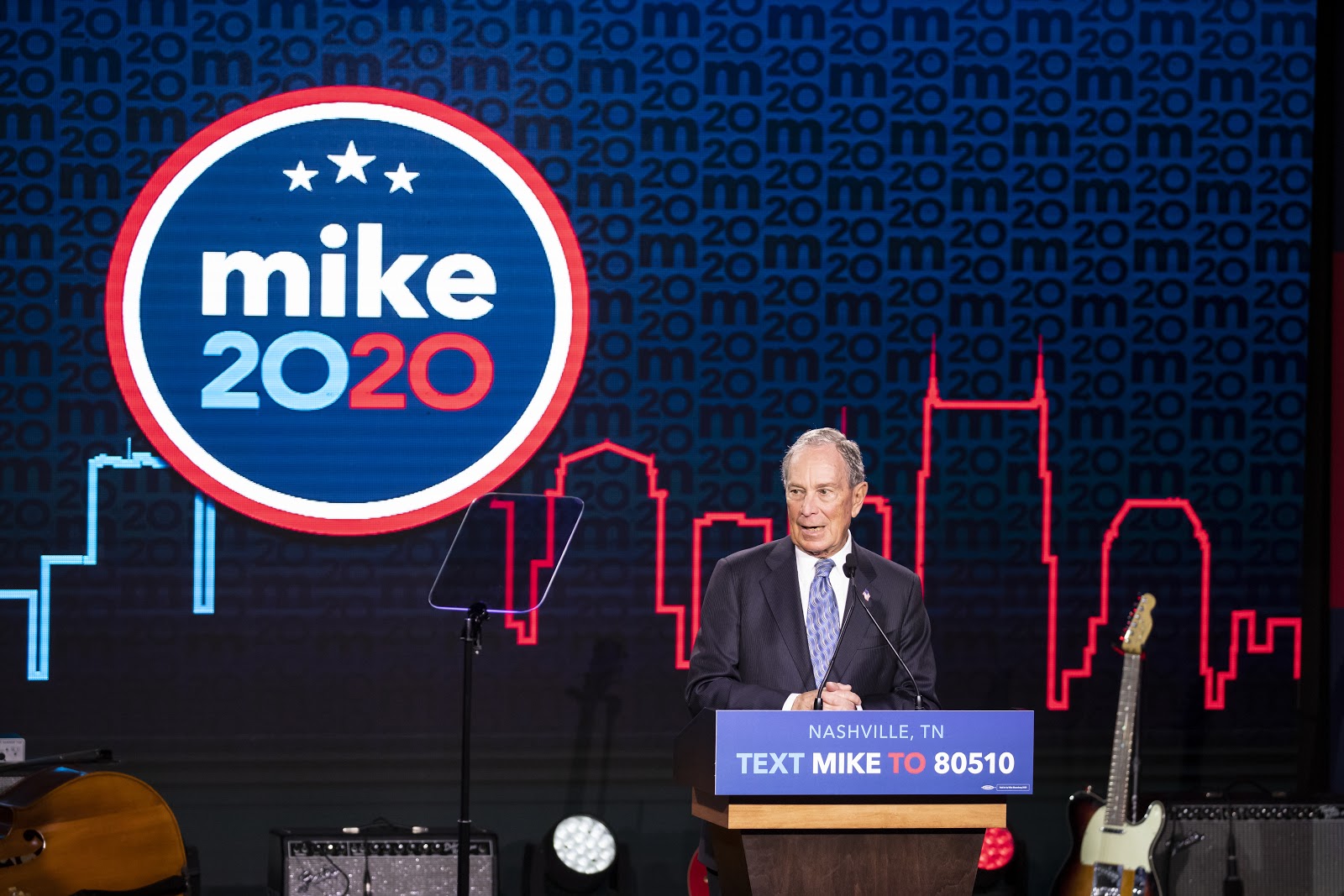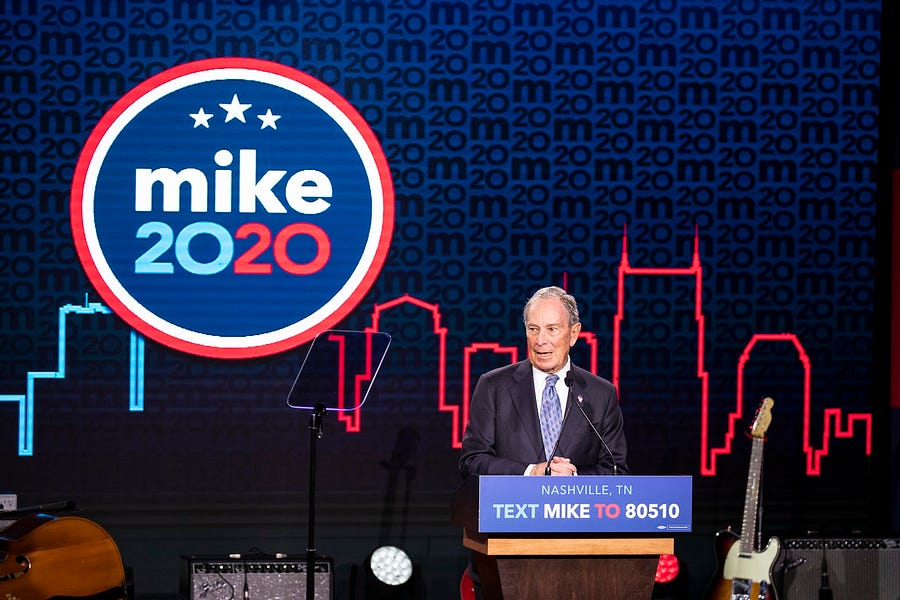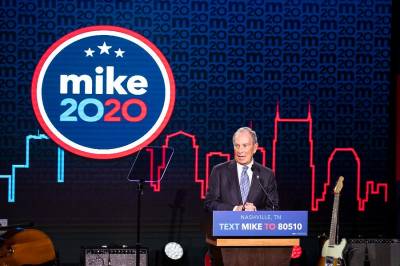Happy Friday! Reminder that today is Valentine’s Day. Might not be too late to grab some flowers and dinner reservations!
Quick Hits: Today’s Top Stories
The Senate on Thursday passed war powers legislation—with the support of eight Republicans—designed to limit President Trump’s ability to attack Iran without new congressional approval. Trump is expected to veto the measure.
Two old hands are returning to the White House, as President Trump grows more suspicious that his staffers are working to undermine his presidency: Hope Hicks, his longtime aide and close friend who left the White House to take a job with Fox News, and former body man John McEntee.
The Trump administration announced it will divert $3.8 billion appropriated by Congress for military purposes to build a wall on the southern border, earning a rare bipartisan rebuke on the Hill.
Nevada’s powerful Culinary Workers Union Local 66 is declining to endorse a candidate in next week’s Democratic caucuses, in a move widely seen as a further blow to Joe Biden’s prospects in the state.
$1 Billion Can’t Buy The Presidency—But Can $60 Billion?

In the months since former New York Mayor Mike Bloomberg entered the 2020 race, your Morning Dispatchers have frequently been tempted to write him off as a sideshow. Here comes yet another self-appointed moderate unifier, here to further split the moderate vote, we thought to ourselves. Even his theory of the race seemed forgettable: beating down his opponents through financial shock-and-awe was the same play Tom Steyer had already been attempting for more than a year.
Well, we’ve learned a valuable lesson since then: There are billionaires, and then there are billionaires. Steyer’s copious spending dwarfed the field for all of 2019, but even that was pennies compared to what Bloomberg—whose $61.8 billion fortune is nearly 40 times greater than Steyer’s—has brought to bear since he declared back in November. This graph from FiveThirtyEight of each candidate’s TV ad spending gives a sense of the scale involved (Note Bloomberg in yellow):

And then there are the untold sums Bloomberg has poured into building out mammoth campaign operations in states that less flush candidates are barely looking at yet. Bloomberg has as many campaign staffers in states with contests weeks out as the leading candidates have in states where voters will be casting votes in a matter of days.
This is the sort of spending that gets results: Bloomberg has rocketed up the charts and now sits in third place in the trusty RealClearPolitics polling average. He’s been boosted by the fact that neither Iowa nor New Hampshire produced a clear, commanding frontrunner: Bernie Sanders won the popular vote in both states, but Pete Buttigieg is the current delegate leader.
Along the way, Bloomberg has taken a sledgehammer to former frontrunner Joe Biden’s support: His rise in the polls maps almost identically onto Biden’s national sag. With a functionally infinite amount of cash on hand, it’s easy to envision a scenario where Bloomberg comes roaring into contention on Super Tuesday and consolidates his position in a bunch of later states where other candidates hadn’t been able to match his on-the-ground and over-the-airwaves presence until it was too late.
What’s standing against Bloomberg’s primary bid? Pretty much everything else. The former mayor’s personal and political history is awash with stories to raise the eyebrows of voters across the ideological spectrum. There was his stewardship of New York City’s controversial “stop and frisk” policy, which institutionalized racial profiling and subjected millions of citizens to unwarranted searches. There’s a long history of allegations about Bloombergs’ inappropriate and crude sexual behavior. There was his longtime championing of policies like the New York soda ban, which turned him into a nanny-state punchline among many Republicans. And, as David French pointed out last November, there’s his terrible record on religious liberty, as best expressed by his lengthy fight as mayor to forbid churches from worshiping in New York City school buildings on the weekends.
Then there’s the fact that Bloomberg’s entire narrative—that he’s a pragmatic moderate who can take head off the party’s leftward charge to ensure Democrats defeat Donald Trump—is highly suspect on the merits. A quick perusal of Bloomberg’s website is enough to show that Bloomberg, were he to win the nomination, would be the furthest-left major presidential candidate in modern American history. His “moderate” reputation owes primarily to his chummy relationship with New York media; as with Hillary Clinton before him, he’s a candidate who is despised by the socialist left. But even with his past affiliation with the Republican Party, can Bloomberg win over centrists and right-leaning Trump skeptics running as a liberal?
Will any of that matter? It’s too early to say. For now, though, it’s an amazing spectacle to watch what truly unlimited money can do for a person in American politics.
Will the Real Bill Barr Please Stand Up?
In the past two editions of The Morning Dispatch, we’ve looked at the Department of Justice overruling its own prosecutors’ sentencing guidelines for longtime Trump hanger-on Roger Stone and the president’s pretty blatant interference in the DoJ’s judicial process, congratulating Attorney General Bill Barr for “taking charge” of the case.
Barr has taken his lumps in recent days for the ostensible miscarriage of justice, including in this here newsletter. Yesterday, he fought back.
In an interview with ABC News’ chief justice correspondent Pierre Thomas, Barr said he and his team decided on Monday, before Trump’s tweet, that a seven- to nine-year sentencing recommendation for Stone was too high.
“I came to the view, as my colleagues did, that I wouldn't support affirmatively advocating what I thought was an excessive sentence,” Barr said, conceding sentencing decisions are for the judge, not the Department of Justice, to make. “We're not the decision maker.”
But then, according to Barr, President Trump’s Tuesday morning tweet weighing in on the situation threw the whole department for a loop.
“I had made a decision that I thought was fair and reasonable in this particular case,” Barr said. “Once the tweet occurred, the question is, ‘well, now what do I do?’ And do you go forward with what you think is the right decision, or do you pull back because of the tweet? And that just sort of illustrates how disruptive these tweets can be.”
The comments were shocking—Trump does not take too kindly to criticism, especially from those who work for him. But Barr wasn’t done.
“The president has never asked me to do anything in a criminal case,” he continued. “However, to have public statements and tweets made about the department, about our people in the department, our men and women here, about cases pending in the department, and about judges before whom we have cases, make it impossible for me to do my job and to assure the courts and the prosecutors in the department that we're doing our work with integrity.”
“I'm not going to be bullied or influenced by anybody. And I said, whether it's Congress, newspaper editorial boards, or the president. I'm going to do what I think is right … I cannot do my job here at the department with a constant background commentary that undercuts me.”
The remarks are among the most critical of Trump by any active member of his Cabinet, and show that even Barr has a limit to how much reputational damage he’s willing to take in service of the president. His agreeing to testify before Congress next month could be viewed in a similar vein. A Justice Department source tells The Dispatch things have been very tense at DoJ this week.
Sens. Lindsey Graham and Mitch McConnell quickly jumped to the attorney general’s defense.
“[Barr] is the right man at the right time to reform the Department and stand up for the Rule of Law,” said Graham, chairman of the Senate Judiciary committee, in a statement. Barr, he added, has his “complete confidence.”
Speaking with Fox News’ Bret Baier, McConnell said, “The president made a great choice when he picked Bill Barr to be the attorney general, and I think the president should listen to his advice.”
The White House’s response to Barr’s comments, via press secretary Stephanie Grisham, was surprisingly subdued. “The president wasn’t bothered by the comments at all and he has the right, just like any American citizen, to publicly offer his opinions,” she said. “The president has full faith and confidence in Attorney General Barr to do his job and uphold the law.”
But it looks like not everyone got the memo. After saying Bill Barr is “doing the Lord’s work” on Wednesday night, Fox Business’ Lou Dobbs, the most servile of all Trump lackeys, did a pretty amazing about-face just 24 hours later.
To paraphrase former President Obama, let us be clear. Barr may have expressed frustration with Trump’s weighing in on Justice Department matters, but the attorney general still overruled federal prosecutors’ sentencing recommendation in a case he knew the president maintained an active interest in. The final chapter in this saga has not yet been written.
How to Get the Most Out of Polls
Polls can be an incredibly helpful tool to gauge voter preferences, and are not as inaccurate as some might have you believe.
But they can be difficult to interpret correctly, and often media outlets will present findings devoid of context for a quick click. On the site, Sarah outlines five key things to keep in mind as you’re reading survey data. An excerpt:
Other times, though, it's an inherent problem with the poll itself. Asking someone if they own a cat is a factual question—they either own a cat or they don't. A cat owner could lie to you or forget (if they are a particularly bad cat owner,) but most likely they will report to the pollster that they own a cat.
But now ask them if they support Medicare for All. First, they need to know what Medicare for All. As Slate noted, "[t]he phrase 'Medicare for All' tended to poll well early on, but its popularity tended to drop once respondents were told it would require them to give up their private insurance." Second, they need to understand what the pollster means by "support"—support the concept in theory or support passing legislation if it means cutting other programs to pay for it or raising taxes? Or they're just sick of healthcare policy in this country and think the pollster is asking whether they want to see change? This is why you so often see contradictions in policy polling.
Polling people on their preferences is just a tricky business—a quick intro to psych class or neuroscience primer will tell you that people are not always able to answer questions about their own motivations or preferences even if they want to. And yet we put enormous public policy weight into how they answer questions during a brief phone call from a stranger.
Worth Your Time
Your Morning Dispatchers love Costco. Which means we also love this long, enthusiastic paean from writer Bryan Lehrer to America’s premier minimalist bulk retailer, which somehow manages to stand as a living affirmation of the maxims that “bigger is better” and that “less is more” both at once. Come for the glowing encomium to Costco, stay for the econ lesson about how the place manages to stay in business and profitable while selling rotisserie chickens for $4.99.
While we’re at it, have a gander at this old Wall Street Journal feature about the German invasion of discount grocer Aldi, which explains how the the no-frills store took the tightly competitive U.S. food market by storm with a counterintuitive philosophy: a near-complete rejection of the principle of consumer brand choice, replaced by stores that stock store-brand essentials at unbeatable prices.
Presented Without Comment
(h/t reader Steve Gordon)
Also Presented Without Comment
Also Also Presented Without Comment
Something Fun
This is our promise to you: We here at the Morning Dispatch will never advocate for putting mustard on your Oreos. Not even once.
Toeing the Company Line
The latest Dispatch Podcast is live: Sarah, Steve, Jonah, and David break down the results in New Hampshire and whether the “lanes” framework is still relevant in presidential elections before turning to the Roger Stone kerfuffle and its impact on the rule of law. Be sure to subscribe, rate, and review here!
The latest Advisory Opinions podcast also touches on the Stone case before going behind the scenes of opposition research and discussing the Netflix documentary series, Cheer. Check it out here!
David’s Thursday French Press takes a detailed look at the jury in Stone’s trial and whether or not nine years would be an excessive sentence. Yes, it’s true that the lead juror appears to have been a Democrat and a partisan. But it’s also true that Stone’s defense team questioned her about her views and declined to strike her from the jury pool. David also zooms out to ask, is Donald Trump abusing his power with his public tirades against his enemies? Give it a read here!
It’s been a very bad spell for China even aside from the coronavirus. The U.S. indicted four Chinese military members for their role in the Equifax hack, and the U.S. also announced it has discovered that “Huawei has backdoor access to mobile-phone networks around the world.” On the site, Danielle Pletka looks at—believe it or not—some successes we’ve had in the Middle East that can help us counter the threat that China presents.
Let Us Know
With baseball spring training officially underway, the Houston Astros—after shielding their players from media questioning for most of the off-season—are finally having to address the Banging Scheme™ and apologize for their role in it. And by all accounts, they are doing a stellar job.
Our question to you: How could they have made that “apology press conference” even less sincere?
Players reveal they were crossing their fingers behind their backs the whole time.
A teleprompter.
Alex Bregman concludes his remarks with, “There, you happy?”
Players bang on a trash can to give Jim Crane a heads up on which reporter is asking the next question.
Reporting by Declan Garvey (@declanpgarvey), Andrew Egger (@EggerDC), Sarah Isgur (@whignewtons), and Steve Hayes (@stephenfhayes).
Photograph of Mike Bloomberg by Brett Carlsen/Getty Images. Advertising spending graph reprinted with permission from FiveThirtyEight.







Please note that we at The Dispatch hold ourselves, our work, and our commenters to a higher standard than other places on the internet. We welcome comments that foster genuine debate or discussion—including comments critical of us or our work—but responses that include ad hominem attacks on fellow Dispatch members or are intended to stoke fear and anger may be moderated.
With your membership, you only have the ability to comment on The Morning Dispatch articles. Consider upgrading to join the conversation everywhere.